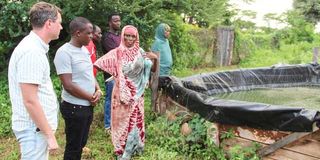Pastoralists embrace crops to beat climate change effects griculture

Makal Mamo, the leader of Malka Bisanadi Cultural Village group, explains the rearing of fish to Wiebe Smit, Clim-Eat Policy and Impact Innovator, and Kevin Gitau Ng’ang’a, the organisation’s Climate Action Strategist, on May 2. Gitonga Marete | Nation Media Group
What you need to know:
- For now, pastoralists are a happy lot, with pasture and water in plenty, owing to the heavy rains.
- Crop farming is one of the ways of coping with the vagaries of weather.
During the long drought last year, Mohamed Godana – a herder in Isiolo – lost more than 50 cows and at least 100 goats.
For now, pastoralists are a happy lot, with pasture and water in plenty, owing to the heavy rains.
“There is enough milk and food for my family when it rains. Drought, however, spells doom for we have to move long distances in search of grass and water. We even buy fodder,” Godana tells Seeds of Gold in Garbatulla.
“We take our animals to Meru National Park but that comes with challenges too. Grazing there is not permitted and wild animals attack our livestock.”
Godana wishes to have camels but prices are prohibitive. The Godana and other pastoralist families are changing livelihoods as a way of coping with the deadly effects of global warming.
Ali Kuno, another Garbatulla resident, says droughts and flooding have rendered many households destitute. The camel is the preferred animal.
“Because droughts have become unpredictable and long, many families have sold their cows and goats and bought camels instead. The problem is the cost of one camel. An adult camel is about Sh200,000,” Kuno says.
Integrated farming
Crop farming is one of the ways of coping with the vagaries of weather.
Fridah Kairuthi is the leader of a women’s group that engages in integrated farming. The group of around 15 plies its trade on a two and half-acre piece.
The women grow tomatoes, capsicum, spinach and other vegetables. They also have cows. The waste from the cowsheds is used to make biogas.
“I also make fodder. The by-product from the biogas is good manure. This is profitable. Our lives have improved,” Kairuthi says.
She has witnessed thousands of animals die during dry spells. Diversifying has helped pastoralists weather the storm of droughts.
“Families come to buy our fodder during dry seasons. We can make up to Sh30,000 in three months. It may not look much but the money helps us take care of our families,” she says.
In Kinna ward is another group of women practising integrated agriculture on 10 acres. The group is known as Malka Bisanadi Cultural Village.
Group leader, Makal Mamo, says the women grow drought-resilient crops like beans, grass for fodder, chilli and sweet potatoes. The group also practises goat, poultry and fish farming. It has a kitchen garden too.
“Making fodder is important because we are able to feed our goats and sell the surplus during drought,” Mamo says.
From the farm, the 25 women can make up to Sh300,000 a year. They save their money through table banking.
“We’ve also won the war on malnutrition as our crops are nutrient-rich. However, convincing pastoralists to shift to crop production is not easy,” she says.
Packaging camel meat
Malka Bisanadi Cultural Village group has started packaging camel meat. The women cut steak into small pieces and fry, giving it the flavour of a dish that is locally known as nyirinyiri. It has a shelf life of three months.
Pastoralists have been integrated into the agri-food system, which studies show, account for up to 30 per cent of greenhouse gas emissions globally.
Agri-food system refers to activities related to producing and consuming food. Experts want agro-pastoralists given practical training in order to understand the new environment.

Abdi Kalla, a Garbatulla local, with a camel calf. Families are selling other livestock to buy camels.
“Increased temperature, changing rain patterns and prolonged droughts are challenges to farming communities. Food systems need to be climate resilient,” says Kevin Gitau Ng’ang’a, the Kenya Climate Action Strategist at Clim-Eat, an organisation helping farmers tackle challenges related to global warming.
“Farmers are encouraged to practise regenerative agriculture, which involves crop rotation, cover cropping, no-till farming and rotational grazing. These rebuild soil health and increase biodiversity,” he says, adding that pastoralist families need to be assisted to buy camels.
Gitau encourages dialogue between farmers, devolved governments and other stakeholders.





